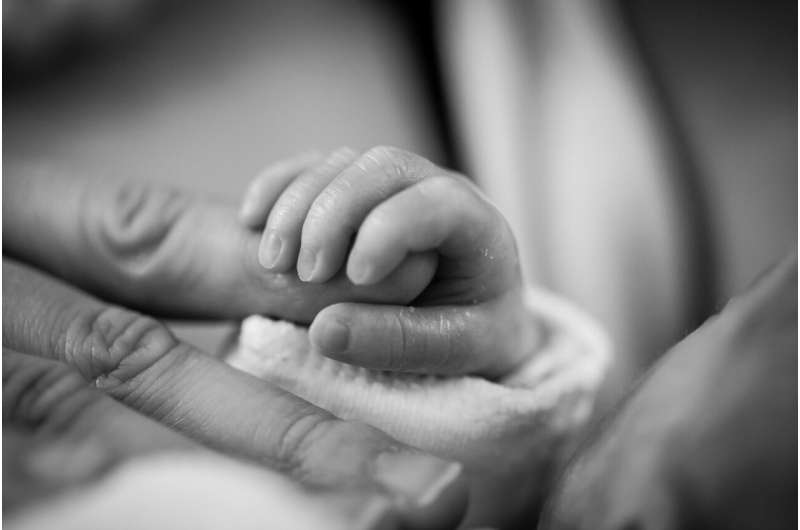Research into pregnancy, birth and infant care is underfunded—and women are paying the price

Research in the UK is overwhelmingly male—male participants, male researchers, and male topics, despite 51% of the population being female. The lack of research on, by, and for this half of humanity has many detrimental effects—not least on the decisions women have to make during pregnancy, childbirth, and child rearing. In my latest book, Informed is Best, I explore the impact of incomplete and biased research in this area, and try to guide parents, and those supporting them, on how to read and judge the evidence that does exist.
Despite many women feeling the pressure
to accept interventions during childbirth without question, there are often gaps in the evidence to support their treatment. For example, few studies have explored whether giving antibiotics to
In an absence of good evidence, a tendency to "err on the side of caution" means that many women have unnecessary interventions during childbirth. Others have to fight to prove that their preferred option is safe, even when this is a biologically normal behavior such as breastfeeding or safely sleeping with their baby.
Unequal research
This evidence is exacerbated by historic inequalities in which research is conducted and by whom. For many years, women were often excluded from clinical trials because their bodies were seen as too complex due to hormonal fluctuations. Yet those findings from all-male trials were used to determine treatment for everyone.
Research that benefits men is still more likely to be conducted. For example, five times more research is conducted into erectile dysfunction—a condition that affects 19% of men—compared with premenstrual syndrome, which affects 90% of women.
Meanwhile, research into birth and parenting, receives much less funding. Data from the US shows that although 10% of women become pregnant each year, just 2% of research funding is spent on pregnancy research. Likewise, a recent review identified that perinatal health research is still underfunded.
And when it is conducted, it's not conducted equally. Despite being disproportionately affected by adverse pregnancy outcomes, research often ignores the needs of women of color – including black women, who are five times more likely to die during pregnancy and birth in the UK.
These inequalities are only worsened depending on who has the opportunity to conduct research. In the UK those who are white, middle class and male are more likely to gain senior academic posts and funding. Around 68% of all professors are white men, and only 0.1% are black women.
When female academics seek research funding, they face further barriers. A recent study showed that funding applications containing words such as "vaccination," "children" and "health" were 16% less likely to receive a high review score than grants using words such as "detection," "bacteria," and "drug." Women were more likely to use the first set of words and men the latter.
One area where women are more equally funded is in the social sciences. But the discipline's focus on qualitative methods, such as interviews and observations, is sometimes taken less seriously. Many instead consider randomized controlled trials the best way to conduct research, as the element of behavioral choice and any associated demographic factors, such as age, gender or race, are removed.
However, conducting trials in birth and parenting research can have ethical implications. For example, you cannot randomize mothers to have a vaginal or cesarean birth, or to breast or formula feed. Also, qualitative methods are often better able to understand what is important to women, such as understanding their experiences of having labor induced rather than simply physical outcomes.
Research costs money
Another issue is who funds research. Research costs money—money which often comes from an industry that stands to benefit from the findings. This means that research that doesn't promote the use of a particular product is further disadvantaged, skewing what data is published. Alternatively, funding sources may be available but ethical issues arise. For example, although the formula milk industry may offer funding to research breastfeeding, many researchers are ethically opposed to taking such funding.
Although industry has played an important part in many health discoveries, research funded by industry is more likely to have outcomes that benefit it. This theoretically shouldn't make a difference in how research is conducted, but funders can control the release of findings, skewing the balance in their favor. For example, one famous industry-funded study examining whether specific infant formulas could prevent allergies, was found to have falsified data and was subsequently withdrawn.
These layers of power and bias in who funds and conducts research are happening across every area of science. But in the case of birth and parenting research, women are already fighting a system that often focuses on risk, intervention and medical authority. It's especially important that any research used to inform their care is as free from bias and as full a picture as possible.
It's also worth noting that a lack of research evidence isn't necessarily proof that something is not important. One famous example argued that because there were no randomized controlled trials showing whether jumping out of a plane with a parachute or not had any benefit, there was no evidence that parachutes were necessary.
Although satirical, it had a very important point. Continuing to research and gain an understanding of how to better support new parents, particularly including those from under-served communities. Research will always be important. But it's also important to recognize that it's not always a full picture—and this can have a serious impact on those affected.
This article is republished from The Conversation under a Creative Commons license. Read the original article.![]()

















